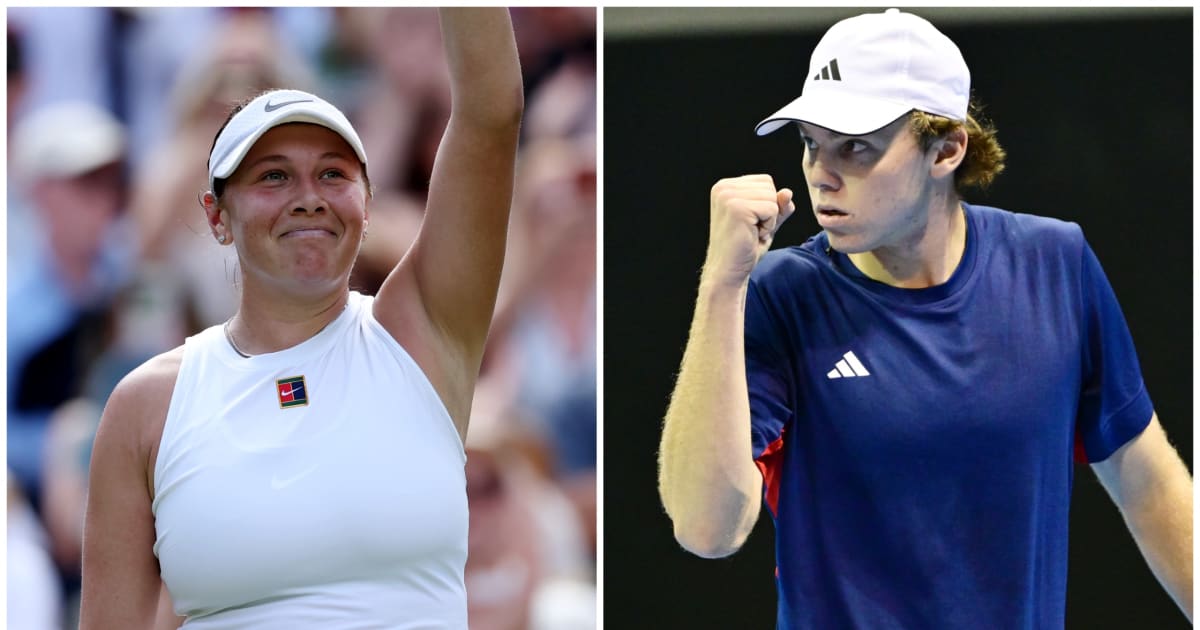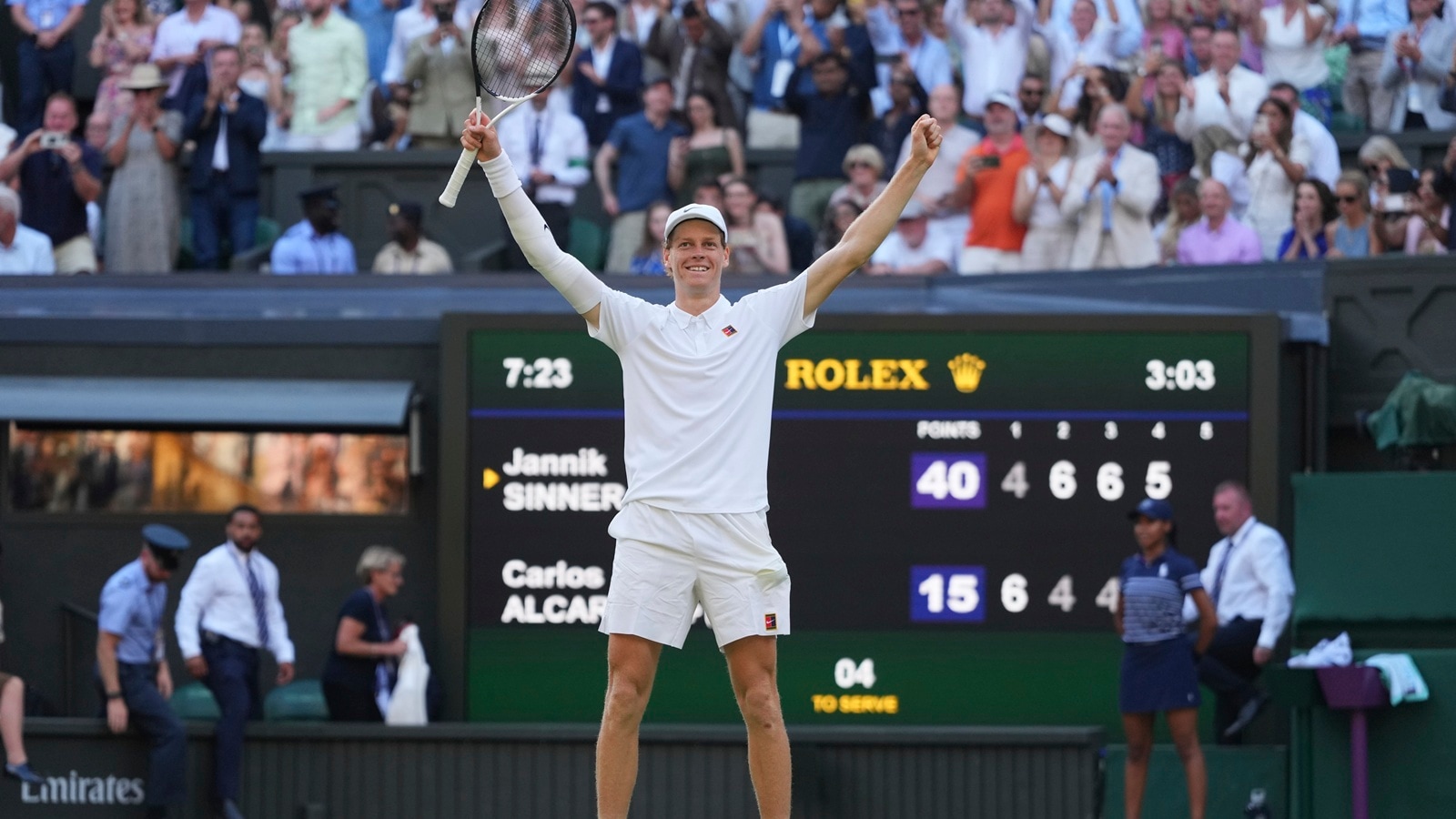Wimbledon final: Jannik Sinner beats Carlos Alcaraz to win first Wimbledon title

Follow live coverage of reaction and anlaysisTHE ALL ENGLAND CLUB, LONDON — Jannik Sinner beat Carlos Alcaraz 4-6, 6-4, 6-4, 6-4 in the Wimbledon final on Sunday.The No. 1 seed prevailed over the No. 2 seed in a tight match ultimately decided by two stunning set points, Alcaraz’s grass tools malfunctioning and Sinner’s steadiness behind and against second serves.AdvertisementIt is his first Wimbledon title, and his fourth Grand Slam title. The win also snaps Sinner’s streak of five successive defeats against Alcaraz, taking their head-to-head in ATP matches to 8-5 in the Spaniard’s favor.The Athletic’s writers, Charlie Eccleshare and Matt Futterman, analyze the final and what it means for tennis.How Carlos Alcaraz stole the first set…Alcaraz had won the previous five meetings in this growing rivalry, but all bar one required a deciding set. Two were so close that they needed a deciding tiebreak, including the epochal French Open final last month.Sinner’s problem has been that he can live with Alcaraz for the vast majority of matches and even outhit him for stretches, but the Spaniard has a supersonic top level that even the world No. 1 can’t match. It was on full display in that tiebreak at the French Open, when Alcaraz took a 7-0 lead and then won it 10-2.So it proved again in the final point of the first set on Sunday. By their crazily high standards, the first set was sedate, dominated by serves on the hot, fast grass. Alcaraz, as is often the case, chose to save his best for last.Serving down set point at 4-5, Sinner put a 110-mile-per-hour second serve onto the line, and produced two forehands that would have been enough to win the point against anyone else. He went for broke on the second, blasting it down the line from way out of position outside the tramlines.But Alcaraz returned the second with his signature defensive shot, a carving backhand slice on the run that floated just over the net. Sinner, stranded having thought he was hitting a winner, couldn’t get near it.Alcaraz’s finger went to his ear, just like it did in Paris when he began his incredible comeback, and Sinner must have felt like he was reliving a nightmare. It was a microcosm of their rivalry up to that point. Sinner great, Alcaraz just that bit better.Charlie Eccleshare… and how Sinner respondedThe way Alcaraz nicked the first set, including its final thrilling point, would sink a lot of players. Sinner had been ahead 4-2. When he looked up 20 minutes later, he had lost four straight games and was down a set.How was he going to react? Just about everyone knows Alcaraz is almost unbeatable in five-set matches, and Sinner played the second set with a now-or-never approach, showing more emotion in one set than he often does across an entire tournament.AdvertisementHe got the early break as Alcaraz’s serve grew wobbly, but the next nine games were not without jeopardy for Sinner. Each time crunch time arrived, he responded.He let out a big, “Let’s go!” when a big serve helped him avoid facing a double break point. There was another rare yell when he induced a forehand error from Alcaraz to prevent the same fate four games later.And as he served to close out the set, he found himself well out of the opening point as Alcaraz came in following a blast into Sinner’s forehand corner. He sprinted off the court to get it, then headed diagonally toward the opposite net post as Alcaraz left a drop volley high and too long. Sinner caught it and rolled the backhand pass. He pumped his arm as he watched it cruise off the court and waved it some more to meet the roars of the crowd.The ultimate response might have been on the two final points, when Alcaraz tried to overpower him with an inside-in forehand blast, Sinner bettered it with his own forehand down the line. On set point, he went tramline to tramline to stay in the point, before winning it with a running forehand crosscourt.The numbers matched the eye test. He was attacking 38 percent of the time in the second set compared with 25 percent in the first. His first-serve percentage went from 55 percent to 67 percent.Sinner had changed from someone who was playing to someone who was fighting.Matt FuttermanA hard-court match on Wimbledon’s grassAlcaraz’s greater variety is what gives him an edge over Sinner. This edge should be exaggerated on grass, where drop shots and the confidence to get forward and volley are what separate Wimbledon champions from those who can bash from the baseline without much variety.The drop shot is so often Alcaraz’s difference maker, the special sauce that even Sinner doesn’t possess — but on Sunday, not so much. When Sinner hit the first drop shot of the match, a very effective one in the seventh game, it could have been a portent of things to come or just a quirk.AdvertisementIn reality, it was somewhere in between. Sinner has worked hard on improving his drop shots — one of the great things about these rivalries is how they force players to improve any slight weaknesses — but he didn’t use them especially often on Sunday.What was more striking was Alcaraz’s struggles to execute his own. Sinner’s speed across the ground means drop shots need to be even better than normal, but even so, the handful Alcaraz put into the net were out-of-character. This is a guy who nailed one when 0-15 down serving for this title against Novak Djokovic two years ago, having missed one on the previous shot.Carlos Alcaraz’s touch game evaporated in the Wimbledon final, taking away his surface advantage. (Glyn Kirk / AFP via Getty Images)It was a sub-plot that proved crucial in a match where the difference in points won was 13 in Sinner’s favour. Alcaraz started playing a bit more safely when he hit his drop shots, allowing Sinner to chase them down and take control of the set.With the advantage of his variety taken away, this suddenly became a less typical grass-court match. It was a straight shootout, in which Sinner, who found a groove on his serve from the third set, started to dominate from the baseline, winning 47 percent of points there to Alcaraz’s 43.The previous six Grand Slams had followed a pattern of hard-court Sinner wins and wins for Alcaraz on grass and clay. It took a grass-court match becoming more akin to a hard-court one for that streak to finally break.Charlie EccleshareThe second-serve conundrum that Sinner solvedIn a matchup that exists in the tennis imagination as a collection of remarkable rallies and key points, this Wimbledon final quickly became a contest of serve and return.Alcaraz hit more aces and had more unreturned serves, but Sinner's first serve gave him more of an attacking platform, which he turned into a winning advantage as the match went on. In the first set, he was in attack 25 percent of the time to Alcaraz's 20 precent; in the second and third, Sinner extended that advantage to 38 vs. 22 and 40 vs. 19.AdvertisementSinner raised his first-serve points won percentage as the match went on, while Alcaraz kept his impressively high. On average, they finished about dead even, but Sinner created separation set by set. He also won far more second-serve points than Alcaraz, going for power when he was hitting them and when he was returning them, setting up plus-one opportunities that kept his attack percentage high and prevented Alcaraz from mixing up the rhythm of points with his variety.Sinner had used a similar strategy in the French Open final. Alcaraz just defused it.Last weekend, as his game caught fire in the middle of the tournament, Alcaraz said how much easier it is to play when he is serving well. He doesn’t have to pull rabbits out. He can do that against so many other players. He did it against Sinner on the clay in Paris, where he could work points around to his advantage, especially as he began to redline in the last two sets.On Sunday in the final at Wimbledon, the dynamic flipped. Alcaraz's improved first serve took him out of pressure situations time and again. But on the second serve, the grass and Sinner rushed him out of time.Matt FuttermanHow Sinner vanquished memories of ParisIn Paris, Sinner suffered the ultimate heartbreak of having three championship points and not winning the French Open. No male player has ever missed that many in a Grand Slam final. He also had a chance to serve out the match, but he faltered there, too.And so when Sinner’s first serve deserted him at 4-3 up in the fourth set, flashbacks started coming thick and fast. Alcaraz earned two break points and the chance to level the set at 4-4. In response, Sinner locked in, saving one break point with a powerful second serve and the other with a 134-mile-per-hour rocket out wide. Alcaraz returned the latter brilliantly but then went for too much with a forehand.AdvertisementSinner eked out the hold, but then he had to do what he couldn’t manage at Roland Garros: serving it out at 5-4 in the fourth set. The crowd cheered, “Carlos, Carlos,” as the players got off their chairs, desperate to will this into a fifth set like five weeks ago. They did so again when Sinner went up 15-0, forcing him to wait to hit a serve, ramping the tension up further. A big serve and backhand winner down the line later and it was 30-0. Then even Alcaraz couldn't chase down a backhand volley, and Sinner had three championship points, just like in Paris.Alcaraz saved the first, but with one last heave of his right arm, Sinner slammed down a serve that Alcaraz could barely get a racket to. Sinner had his redemption, just over a month later.Charlie EccleshareWhat did Jannik Sinner say after the final?“Thank you for being the player you are. It’s so difficult to play against you,” Sinner said to Alcaraz on court.“We have an amazing relationship off the court but we play well on it. Keep going, keep pushing and you will hold this trophy many times. You have held it many times already!“I had a tough loss in Paris. But it doesn’t matter how you win or you lose. You just have to understand what you did wrong and you have to accept the loss and keep working. This is why I hold this trophy here.”What did Carlos Alcaraz say after the final?“It’s difficult to lose. It’s always difficult to lose. But first of all I have to congratulate Jannik once again,” Alcaraz said in his on-court interview.“He really deserves this trophy and he played great tennis these two weeks. You have an amazing team around you and keep it going. You’re improving every day.“I’m proud about everything. At the beginning of the season I was struggling a little bit, on the court and off the court. But I’ve been enjoying being on the court again. I’m excited every time I’m on the court and I have to thank my team and my family.”Recommended reading(Top photo: Julian Finney / Getty Images)











